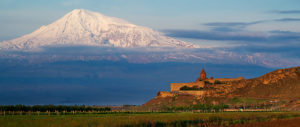
British-headquartered satellite communications company OneWeb has received permission to operate in the South Caucasus country of Armenia, according to the company’s CEO Adrián Steckel in a 1 March 2020 interview with Russian newspaper Vedomosti.
“We have signed a memorandum of understanding with Georgia, Kazakhstan and Armenia also because our constellation can play a major part in digitization of their state programs,” said Steckel.
The go-ahead from Armenia means that OneWeb are now able to provide commercial satellite broadband services in most of the South Caucasus.
As previously reported by SpaceWatch.Global, OneWeb is courting the Republic of Georgia with the aim of establishing a ground station in the country and providing its satellite services to bridge the digital divide in the South Caucasus.
OneWeb also recently signed a Memorandum of Understanding (MoU) with the Astana International Financial Centre (AIFC), the largest financial hub in Central Asia, to accelerate broadband connectivity in Kazakhstan.
At the end of 2019 OneWeb also received a license from the Nigerian Communications Commission (NCC) to provide commercial satellite broadband services in Africa’s most populous country and largest economy.
The announcement of the Armenian operating permission, along with the announcements on permissions from Kazakhstan, Georgia, and Nigeria, suggests that OneWeb may well be leading the megaconstellation pack when it comes to establishing not only all-important landing rights, but also in its imminent roll out of ground and user infrastructure.
Rivals such as SpaceX’s StarLink have emphasised their satellite numbers and launch cadences in building out their satellite broadband megaconstellations, but have remained silent about the all-important ground and user segments that will most likely determine the commercial viability of their business models.
On 7 February 2020 OneWeb successfully launched its second batch of 34 satellites as part of its bid to build its phase one constellation of 648 satellites to deliver high-speed, low-latency global connectivity.
 SpaceWatch.Global An independent perspective on space
SpaceWatch.Global An independent perspective on space




